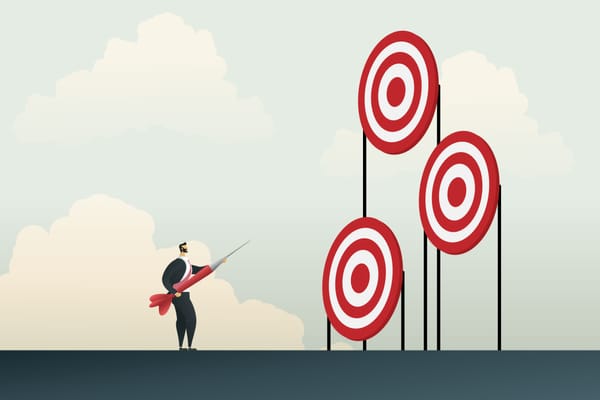Mental overload: How to find balance and inner peace while pursuing your goals

Hello, dear ones!
There are many ways to take care of oneself that can be interrelated. One of them is the prevention of mental overload. This publication is intended for those who are busy with intellectual work, particularly office workers. Let’s find out why it is important to know about mental overload and how to fight against it. This will help you live happier and find the strength for personal projects, education, and everything else. I believe this publication can be classified in the category of "soft skills," so reading it is doubly important.
Before moving to Spain, I successfully avoided mental overload and led a calm lifestyle. About 10 years ago, I took a professional course "Theory and Practice of Teaching," where a month was dedicated to the cognitive skills of our brain and its functioning. In this course, I discovered many new things and, besides regretting not having known them during my school studies, I learned how the brain works and how to work correctly to avoid overload in work and education.
Therefore, before moving to Spain, mental overload did not worry me. However, the stress and the desire to regain my former job and lifestyle, which I previously had, still press on me a lot, and I am not using my own advice, about which I wrote in this publication, several times leading me to total burnout and depression.
Also note that approximately 95% of all information created in the world in the last 500 years has been created in the last few years. And we all consume it, although the brain does not evolve as fast as information develops.

Mental Overloads
Let's start with the definition of mental overload.
Mental overload is a state caused by high mental activity, learning, and lifestyle changes. It is a normal psycho-emotional phenomenon, and fighting it with willpower makes no sense. The stress caused by all of the above only intensifies the overload.
Imagine that your brain is a computer. It works well until the operating memory is filled with open programs. Mental overload is the same, only instead of tabs, you have tasks, information, and stress.
Symptoms of mental overload:
- Difficulty concentrating: ideas slip away, attention is scattered.
- Failed memory: names, events, dates, everything is forgotten.
- Irritation: small things annoy you, you want to respond aggressively to everyone.
- Feeling of tiredness: even after resting, you have no energy for anything.
- Difficulty making decisions: even simple tasks seem insurmountable.
Causes:
- Over-activity of the brain: studying, a complicated project, learning a new language.
- Life changes: moving, changing jobs, the birth of a child.
- Stress: both acute and chronic.
At times like these, you can force yourself to work physically, but not mentally. Mental activity decreases and working under these conditions leads to exhaustion and subsequent depression. I have experienced this personally. The brain has built-in protection against exhaustion: it loses focus and concentration. At that moment, it is better to listen to it and take a break. But if you use a time compression system and replace rest with the completion of other tasks, this can be compared to the situation where a red light on the car's dashboard says "check engine," and you simply cover it with black tape so it doesn't bother you.
If your parents yelled "concentrate!" at you when you had already been struggling with your homework for three hours, they were probably wrong. You needed a break, and children need it even more than adults.
When Tony Robbins motivates you by saying "come on, just do it. Start now," it only works in the short term. There won't be a long-term effect from this. You won't run a marathon with that.
Working a lot does not mean working well. Those who work 60 hours a week are almost as efficient as those who work 40. After 40 hours, the brain simply starts to slow down.

In general, mental overload is a cunning enemy of productivity and well-being. These are those moments of brain fatigue when rest is needed, not the use of willpower to force ourselves to do or learn something.
Productive work time to plan important things
Productivity curve of the day until lunch
According to the latest research, office employees who perform intellectual work, on average, show productivity for 2-3 hours a day. This number can increase to up to 5 productive hours of intellectual work.
Usually, the brain is able to function effectively for 2-3 hours with short breaks and without fatigue. Then it needs a long break to eat and rest to "reset".

Productivity Curve After Lunch
After eating, carbohydrates start to reach your brain, you mentally reset, and you are almost ready to function.
However, there is a small problem: there is more oxygen in your gastrointestinal tract than usual to oxidize and digest the food. Because of this, the brain temporarily experiences a lack of oxygen, making it difficult to function. Even after the hypoxia passes, morning productivity does not fully recover. Studies show that productivity significantly decreases in the second half of the day. After 3 PM, we only have 1-2 hours of productive work left.
Therefore, it is important to keep this in mind when planning important tasks.

If you want to work on your dream
If you are an "early bird" type, try waking up a little earlier than usual to dedicate that time to working on your dream.
If you are a "night owl" type, use the following approach: after work, have a small snack, avoiding heavy meals. Dedicate time to rest, for example, meditation or a quiet walk, but try to avoid social media activity or watching series. After this, dedicate time to realizing your dreams.
How to help yourself
Breaks are everything:
We must remember that the brain constitutes only 2% of our body's weight, but it consumes approximately 20% of all energy. Therefore, rest and breaks are very important.

If your work does not involve a state of flow, take breaks every 45-60 minutes for 5-10 minutes, and without a phone. Personally, I do not recommend the Pomodoro technique with a 25/5 ratio. Instead, take a break to "meditate" with a cup of drink or distract yourself with a pleasant conversation with colleagues. This will help generate oxytocin, the hormone of tranquility. It is best to look out the window or simply be silent, without thinking about anything. This will activate the brain's default system, which will help not only deal with burnout but also increase productivity. After all, everything you have been working on in the last hour will begin to process without your participation and link together to form the so-called "insights."
Stretching, walking, simply closing your eyes: give your brain the opportunity to switch gears.
Move and do physical exercise
Everyone has long known that physical activity is an excellent way to relieve stress and improve mood. Many random studies confirm this. Additionally, recent scientific research has demonstrated at the chemical level the effect of strength exercise on brain health and the improvement of its cognitive abilities.
Find the type of sport you like and practice it regularly.
Eat properly
Try to maintain a balanced diet as much as possible. It is important to find a balance between strictly following the diet and the emotional problems that arise from it. The stress of giving up a piece of chocolate should not outweigh the harm of consuming it.
Everyone probably knows about the balance of proteins, fats, and carbohydrates (PFC), and also that the basis of your diet should be fruits, vegetables, whole grains, and fish. Natural coffee is beneficial in the first half of the day, but no more than two cups. It is also recommended to limit the consumption of sugar, trans fats, and fast food.

https://www.instagram.com/reel/C3vsP7wvh9L/?igsh=MXN0Y3FzMWk3ZXp0ZA==
As an example
- A balanced diet can include a breakfast of omelet (proteins), whole grain bread (carbohydrates), and avocado (fats).
- For lunch, you can prepare a grilled white meat (proteins), mashed potatoes (carbohydrates), and a fresh vegetable salad with olive oil (fats).
- Dinner can consist of grilled fish (proteins), mashed potatoes (carbohydrates), and fresh vegetables dressed with olive oil (fats).
Magnesium
It is recommended to include easily absorbable forms of magnesium in your diet. Magnesium is the element that our nervous system most actively consumes in the process of stress management. As the stress level in your life increases, so does the consumption of magnesium, which we cannot fully compensate for with food.
Healthy Sleep
If you don't have the energy to pursue your dreams, spend time on your favorite hobby, but try to add that time to sleep. During sleep, the brain recovers and is ready for new challenges. Sleep is very important. This should be emphasized, as according to statistics, people on average miss 1-2 phases of sleep, which is approximately 1.5 - 3 hours. Your minimum sleep should be 7-8 hours.
The simplest but powerful meditation helps to quickly reduce stress levels and improve concentration
The basic 4-7-8 technique includes inhaling through the nose for 4 seconds, holding the breath for 7 seconds, and exhaling through the mouth for 8 seconds (with the tip of the tongue behind the upper front teeth).
If this technique doesn't work for you, you can develop your own "three numbers."
Mindfulness
Spend a few minutes a day meditating or practicing mindfulness to clear your mind and reduce stress levels. Personally, I can't stand meditation, but keeping a reflection journal and writing my thoughts on paper helps me a lot. Also, in the new iPhone update from Apple, the "Journal" app appeared. It's an interesting thing with artificial intelligence that will help you choose a topic to write about if you don't know where to start.
Conclusion
Mental overload is a signal from the body to slow down and make changes in the pace of life, not a sentence. By applying the suggested strategies and practices, you will not only be able to manage current overloads but also prevent future ones, ensuring a more balanced and happy state.
I recommend that you not only apply these tips in your daily life but also share your stories and results. I am interested in hearing your opinion, even and especially if it does not coincide with mine. Which tip was most useful to you? Do you have your own methods for dealing with mental overload? Leave your comments below this post and share your experience. Your stories can inspire and help other readers facing similar problems.
And remember, the stress of giving up a piece of chocolate should not exceed the harm of consuming it. So in everything




